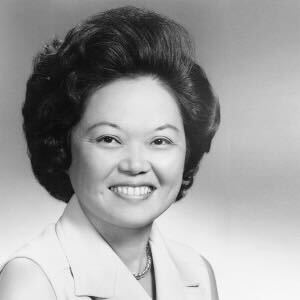As we continue to celebrate Asian American Pacific Islander Heritage Month, we wanted to highlight Patsy Mink, who was the first Asian American woman elected to Congress and an advocate for women’s rights.
Mink was born on the island of Maui in Hawaii in 1927 and was a third-generation Japanese American. She spent most of her young adult life in Hawaii, and tried to get into medical school before being accepted at the University of Chicago Law School. It was there that she met her husband and had a daughter.
After they both graduated in 1951, they decided to move back to Hawaii to find work. Mink had a difficult time finding work because she was married with a child, so her father helped her open her own practice.
Mink then began to get involved in politics, hoping to change old discriminatory customs through the legal profession. She ran and was elected to the Hawaii territorial House of Representatives in 1956. She was the first Japanese American woman to serve in the territorial house, and two years later was the first woman to serve in the territorial senate.
In 1960, Mink gained national attention when she spoke at the Democratic Convention, supporting the civil rights platform. It helped her gain momentum to run for the federal House of Representative in 1964 for the state of Hawaii. She was elected into office that year as the first Asian American woman to serve in congress.
In total, Mink won 12 terms in office, spanning two different time periods, first from 1964 to 1977, and again from 1990 to 2002. During her time in office, she was a champion for education and introduced part of the Early Childhood Education Act of 1965. She also co-authored the Title 9 Amendment of the Higher Education Act, which allowed for equal opportunities for women. (This was later renamed the Patsy T Mink Equal Opportunity in Education Act in 2002)
Mink was also the first East Asian-American woman to seek the presidential nomination for the Democratic Party. As a member of congress, she co-sponsored the DREAM Act, giving rights to children of immigrant families living in the U.S.
Mink died while in office, after contracting pneumonia at age 74. It came one week after she won the 2002 primary election. Mink was given a national memorial, and a full state funeral in Hawaii. She will be remembered as a woman who fought against personal discrimination, and discrimination for all women and Asian Americans. She was also posthumously given the Presidential Medal of Freedom in 2014, the highest civilian honor.
